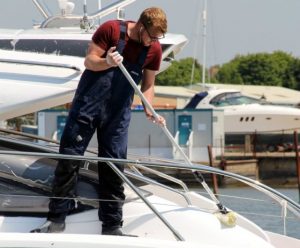Our Charter Management Program
Buy a new Dufour Yacht and place it into our Solent Charter Fleet to generate an income and offset the costs of ownership whilst still having full access and use of the boat.
As UK Dealers for Dufour Yachts we are able to offer very attractive packages on the purchase of a new yacht entering our fleet. We can offer options on finance and can help you through every step of the process including full RYA Training and familiarisation on your new yacht.
We take the hassle out of owning a yacht by running a complete maintenance program so that your investment is being properly looked after ensuring she is ready for your own use as and when you want to go sailing.

We have over 25 years of experience in the charter industry and can advise and assist you in all areas of yacht ownership
We offer a personal and flexible approach always mindful that the purchase of a yacht is a huge investment and as such we are very careful to look after every yacht as if they are our own.

We offer two ownership options
- Fixed Cost Scheme
- Split Income
On a Fixed Cost Scheme you will get an allocation of usage, normally a weekend a month. Two weeks during the season and unlimited number of adhoc / last minute weekdays as you wish. We cover all running costs including berthing, insurance, annual running maintenance.
Our Split Income option is better suited for those that want to enjoy more time on the water. You have complete control and can book out the yacht as and when you wish. We return you 60% of all charter income generated. All running costs of the boat are to your account.
Example IllustrationBased in Mercury Yacht Harbour on the River Hamble this is the ideal location to keep your yacht with easy access into the Solent.
Contact UsYacht Guardiennage
 In certain circumstances we will take on Yacht Guardiennage defined as a complete yacht management scheme. Where your sailing yacht is managed, maintained and cared for by us at Universal Yachting.
In certain circumstances we will take on Yacht Guardiennage defined as a complete yacht management scheme. Where your sailing yacht is managed, maintained and cared for by us at Universal Yachting.
The primary benefit of yacht management is the time that you save in checking on your charter yacht, overseeing any maintenance required and the general winter care. This is a particular advantage if you don’t live locally to the Solent.
The main services included are as follows;
- At least weekly checks on your yacht, to ensure she is secure, which includes checking fenders and mooring lines.
- Once a month, running up of the systems, and providing you with feedback.
- Arrange, coordinate and oversee any maintenance work required on your behalf.
Yacht management schemes:
- Save you money in the long run, by identifying any problems that may crop up in time
- Local knowledge and contacts, in order to get the best possible price and skill set needed to do what is required.
So in essence using a yacht management service gives you the peace of mind that your yacht is being well looked after and maintained by expert staff.






